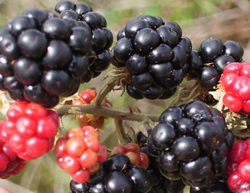Water is very important to small fruits and vegetables because they are more than 95 percent water. Water is also needed for the plant to stay alive.
You can’t depend on rain to keep your garden watered the entire season. A few days of dry weather can dry the ground and adversely affect fruit and vegetable quality.
Since you can’t depend on rain water, irrigation is needed to keep the soil moist but not overly wet. Most plants need about 1.5 inches of water per week. Soaker hoses and drip tape work well, and using mulch will help keep the ground evenly moist for longer periods of time. It is critical to keep small fruits and vegetables moist; for example, if moisture fluctuates in tomatoes, it will cause them to crack.
The “critical times” water is needed for small fruits and vegetables:
Blackberry—at fruit formation and enlargement
Blueberry—at flower formation and fruit enlargement
Raspberry—at fruit formation and enlargement
Strawberry—during leaf and flower development and fruit enlargement
Corn—at silking, tasseling and ear development
Cucumbers—at flowering and fruit enlargement
Melons—at flowering and during enlargement
Onion—during bulb enlargement
Potatoes—during root enlargement
Sweet potatoes—during root enlargement
Squash—at bud development, flowering and fruit enlargement
Tomatoes—at early flowering, fruit set and fruit enlargement















Seems like tomatoes just need water the whole time. 🙂 Thanks for the article, Anthony!
Here’s a bit about watering potatoes: Provide an ample, uniform supply of water. If potatoes get too dry, their growth will stop. When more water is added, they begin new growth from the potato eyes and the result is knobby potatoes. Do not over-saturate nor keep soil soggy.
Comment June 11, 2011 @ 7:21 am